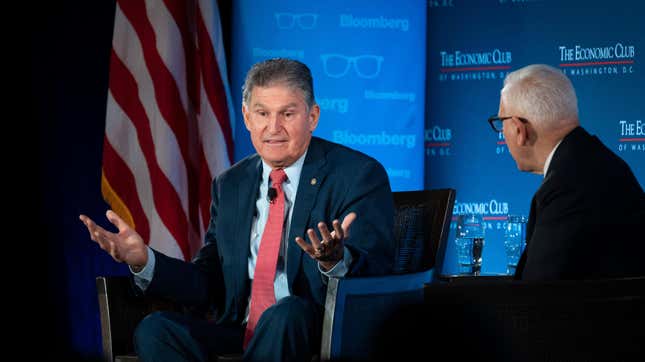
Joe Manchin, the Maserati-driving centrist senator from West Virginia who’s already managed to single-handedly derail the most surefire avenue to reduce emissions in the reconciliation bill and gut key methane reduction provisions, is at it again. This time, Manchin has his NRA-approved sights set on proposed EV tax credits that would incentivize drivers to purchase union-made electric vehicles.
Manchin explained his opposition to the credit in an interview with Automotive News, where he called the proposals “not American.”
“When I heard about this, what they were putting in the bill, I went right to the sponsor and I said, ‘This is wrong. This can’t happen,’” Manchin said. “We shouldn’t use everyone’s tax dollars to pick winners and losers. If you’re a capitalist economy that we are in society then you let the product speak for itself, and hopefully, we’ll get that, that’ll be corrected.”
At issue are tax credits for EV purchasers proposed in the Build Back Better Act that, if passed, would increase the current maximum tax credit of $7,500 eligible for EVs by $4,500, but only for vehicles built using unionized labor. Another $500 credit would be eligible for vehicles that use battery packs made with at least 50% U.S. manufacturing. In theory, drivers who buy a new EV from General Motors (which has backed the deal) could, for example, receive up to $12,500 in credits, a huge incentive to potentially spur EV adoption.
That all matters because price still remains the number one barrier in preventing new EV adoption, according to a 2020 survey from Ipsos Global. Customers in that survey on average said they’d only be willing to pay 10% more for electric vehicles than a similar gas or diesel version. And while U.S. EV adoption is rapidly increasing, it still lags far behind adoption leaders like China and the EU.
According to the research firm Canalys, the U.S. made up just 10% of EV sales worldwide in the first half of 2021, compared to 40% and 47% for the EU and mainland China, respectively. More EV adoption could play an important role in driving down overall emissions since transportation alone accounted for 29% of all greenhouse gas emissions in the US in 2019, according to the Environmental Protection Agency.
Despite all that, the EV tax credits have faced an uphill battle from the start, eliciting strong opposition from a plethora of mostly non-U.S. automakers. Toyota, the world’s second-largest carmaker, has been a leading voice lobbying against the tax credits. In a letter sent to the chairs of the Ways and Means Committee last month, Toyota said the credits would unfairly impact their business and went as far as to claim it would “discriminate” against non-unionized auto workers.
It’s not just foreign firms opposing the credits though. Notably, Tesla, a distinctly anti-union firm, has also opposed the measures, with CEO Elon Musk claiming the tax credit efforts were “written by Ford/UAW lobbyists.”
Meanwhile, a group of 25 ambassadors from the EU and countries including Canada, Mexico, Germany, and Japan all recently wrote letters to U.S. lawmakers claiming the credit would violate an international trade agreement, reports Reuters. The letter claimed the tax credits would unfairly advantage a select few U.S. carmakers and would “undermine the efforts of these automakers to expand the U.S. EV consumer market to achieve the [Biden] administration’s climate goals.”
Manchin’s decision to side with the likes of Toyota and Tesla over just about anyone interested in reducing the U.S.’s reliance on gas-power cars comes, appropriately, just as Toyota announced it will invest $240 million to build hybrid vehicle parts in its West Virginia plant. That’s, of course, the same West Virginia Manchin calls home.
Though the EV tax credits—and, for that matter, even the most ambitious elements of the Build Back Better program—aren’t nearly enough to “solve” the climate crisis, they are the most significant effort being considered by U.S. lawmakers, and likely will be for quite some time given a potential Republican congressional takeover next year. David Wallace-Wells, author of The Uninhabitable Earth, articulated this point well in New York last month.
“Manchin is effectively and single-handedly sabotaging the American government’s ability to address the crisis anytime soon,” Wallace Wells wrote. “And soon very much matters—the next time a Democratic trifecta may be in place to consider climate action, the world may well have already breached the 1.5-degree threshold, if only temporarily.”